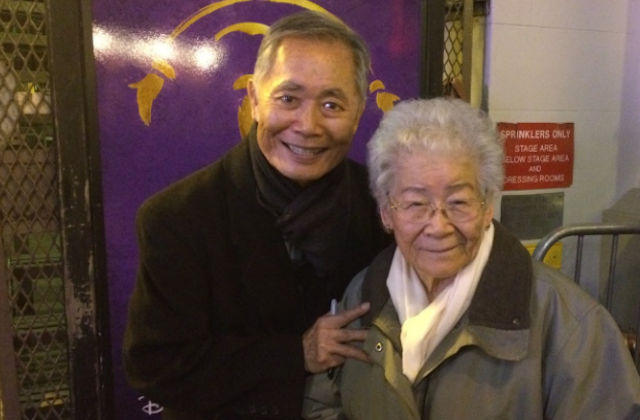This week, I am finding strength in remembering a particularly powerful Thanksgiving that I was fortunate to experience last year. Though my Jewish-Hindu-Christian-Buddhist-American family is a unique amalgamation of faiths, races, cultures, and personalities, we tend to stick to the mainstream tradition of gathering around a giant roasted bird, saying thanks, and tacitly supporting our favorite style of cranberry (relish, duh). In 2015, however, we decided to ditch Highland Park, Pittsburgh, for Broadway with one main goal in mind: Grandma Satako was going to meet George Takei.
George Takei would be in Times Square starring in the musical "Allegiance," a show inspired by his experience in Japanese internment during World War II when over 120,000 Japanese-Americans were incarcerated by the U.S. government simply for being an unfavorable race. My 87-year-old Japanese-American grandma and her family spent several years at Tule Lake Segregation Center, the same concentration camp as George. So the story of "Allegiance" hit home.
Prompted by Grandma Satako’s excitement and determination to see George, my entire family of 15 went to see the musical together. The show captured many details of internment that often go unspoken: the childhoods marked by barbed wire; the shame and heartbreak of patriotism; the painful divisions in families. It also captured the strength of our people—the resilience of family and ritual and the varying forms of resistance from protests to dance parties. Of course seeing this history unfold to the tune of Broadway was a bit surreal, but incredibly emotional nonetheless. Sitting just a couple seats away from my grandma, I pretty much sobbed the entire time.
After the show, we all rallied behind Grandma Satako to strategize a way for her to meet George. We started with some failed attempts to capture his attention by tweeting @GeorgeTakei, and eventually opted for the good old fashioned method of making friends with a theater security guard. Lucky for us, the guard was a hero. After hearing her story, he let Grandma Satako and her party of 14 traverse the barricades and wait right outside the stage door. She was to be the first person to speak with George when he came out.
We all waited anxiously, not knowing if my grandma would know what to say to George. But when he finally did come out she put all of our concerns to shame. Perhaps it was the empowerment she was feeling from having her story acknowledged on Broadway, or perhaps it was the adrenaline from her near celebrity status, but she displayed a confidence and candor that we had not seen from her before. My grandma was hype. She cut right to the chase and called George out for not remembering the time they met briefly 20 years prior at one of the first organized pilgrimages for Japanese internment survivors to Tule Lake. He had been distributing and signing his autobiography but ran out of books before she could get one. The discussion outside the stage door went something like:
Grandma Satako: You ran out of books so I ordered one from you. Don’t you remember that?
George Takei: Sorry, I am getting old. But thank you for coming to join us tonight.
Grandma Satako: Well I keep track of you!
George: Thank you, thank you. Have I been behaving?
The video of their meeting really captures the joy we were all feeling. We came together to see my grandma and her story brought to justice. Seeing her connect face-to-face with a Japanese-American activist, celebrity and fellow Tule Lake survivor was extremely powerful. We saw the shame of internment transform into a pride for her story and her survival.
So this Thanksgiving, as we hear serious talk coming from Trump and his surrogates about using Japanese internment as a precedent for a registry for Muslim-Americans, I have to remember this moment. I have to remember the strength and resilience of my people in the darkest of times. I have to remember how my beautifully messy and diverse amalgamation of a family will always be my posse. And I have to tell Trump this: You better believe that Grandma Satako and her posse are keeping track of you.
A film adaptation of "Allegiance" will play select theaters starting December 13.
Sophie Sarkar is a second generation Bengali-American, a fourth generation Japanese-American, and even a bit English/French Canadian—a mixed identity which she calls “hapahindu.” As the product of a tri-racial kinship, she likes to play with pluralism in her art and writing. Originally from Philadelphia, Sakar is currently an MSc candidate in Regional and Urban Planning Studies at the London School of Economics.
